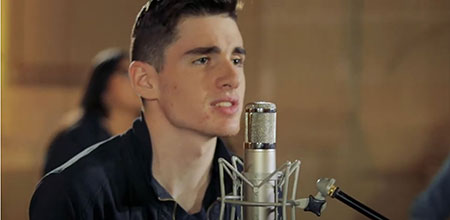Music Degree: Elective Studies
Bachelor of Arts (BA)
Credits
122
Completion Time
4 Years
Delivery Method
Traditional, On Campus at Lancaster, PA
Why Take Music Electives at LBC?
Do you want to study music but also include another elective studies at LBC, perhaps business or communication. There are so many possibilities for elective studies. Maybe you want to study music but aren’t sure of a vocation, such as performance, theatre, worship arts or education. There is a focus on breadth rather than specialized depth in this program. A Bachelor of Arts in Music with elective options might be the degree for you! At LBC, you get an accredited music degree but have some freedom to pursue a second major or a collection of elective credits in music.
Course Length
16 weeks (semester)
Music Elective Program Cost & Financial Aid
Admissions Process
Accreditation
Lancaster Bible College is accredited by the National Association of Schools of Music (NASM).
Can I Transfer Credits?
Yes! Read about LBC’s transfer policy
Music: Elective Studies Program Scope
Bachelor of Arts (BA) (122 Credits)
Bible & Theology Core 36 Credits
Arts & Sciences Core 37 Credits
Music Courses 48 Credits
LBC 100 Foundations Seminar 1 Credit
Christian Service 0 Credit
View the Academic Catalog for the complete curriculum plan, course descriptions and complete program details.
What makes this LBC Music: Elective Studies program unique?
- Take part in internships with local churches to gain practical experience in preparing for and leading worship.
- Learn about practical ministry, philosophical understanding, ministry and top-notch performance training.
- Study under professors and professionals with many years of experience in leading worship at churches both nationally and internationally.
- Develop into highly skilled artist to influence culture with grace and truth.
What are career paths with a Music: Elective Studies bachelor's degree?
The Music: Elective Studies major prepares students for a wide range of technical and/or ministry contexts. Here is a sampling of careers and opportunities this degree affords:
- Church Worship Leader
- Performer
Program Goals – In this program, students will…
- Demonstrate foundational musicianship skills.
- Describe and demonstrate the integration of Biblical worldview in life and career as musicians.
- Apply historical and theoretical understanding to the analysis, performance, and creation of musical forms, processes, and structures found in representative examples from the western music tradition.
- Demonstrate foundational leadership skills in a selected musical area(s) either through free electives or a cognate of courses in a particular area.
- Demonstrate a knowledge of diverse historic backgrounds and the modern context in the chosen general music studies area(s).
Core Courses in the Music: Elective Studies Program
- MUS 100 Music Fundamentals
- MUL 100 Piano Fundamentals
- MUL 101 Piano Lab I
- MUL 102 Piano Lab II
- MWP 102 Intro to Music, Worship, & the Performing Arts
- MWP 400 MWPA Cross Cultural Externship
- MPR 499 Senior Recital
- MUS 101 Music Theory I
- MUS 101L Musicianship I Lab
- MUS 102 Music Theory II
- MUS 102L Musicianship II Lab
- MUS 211 Introduction to Composition
- MUS 211L Musicianship Lab III
- ENS Ensemble (primary)
- ENS Ensembles [4]
- MAP Applied Vocal/Instrumental Study
- MAP 100 MPWA Forum
- MWP 301 Worship & Performing Arts Internship I
- MWP 302 Worship & Performing Arts Internship II
- MWP 450 Worship and Performing Arts Practicum
- Major Electives [4]
Admission Steps
for this Major
Audition for Acceptance into this Major
Every student who applies to any major in the Music, Worship & Performing Arts Department must audition for acceptance into the major of their interest and must also be accepted as a student to Lancaster Bible College.
